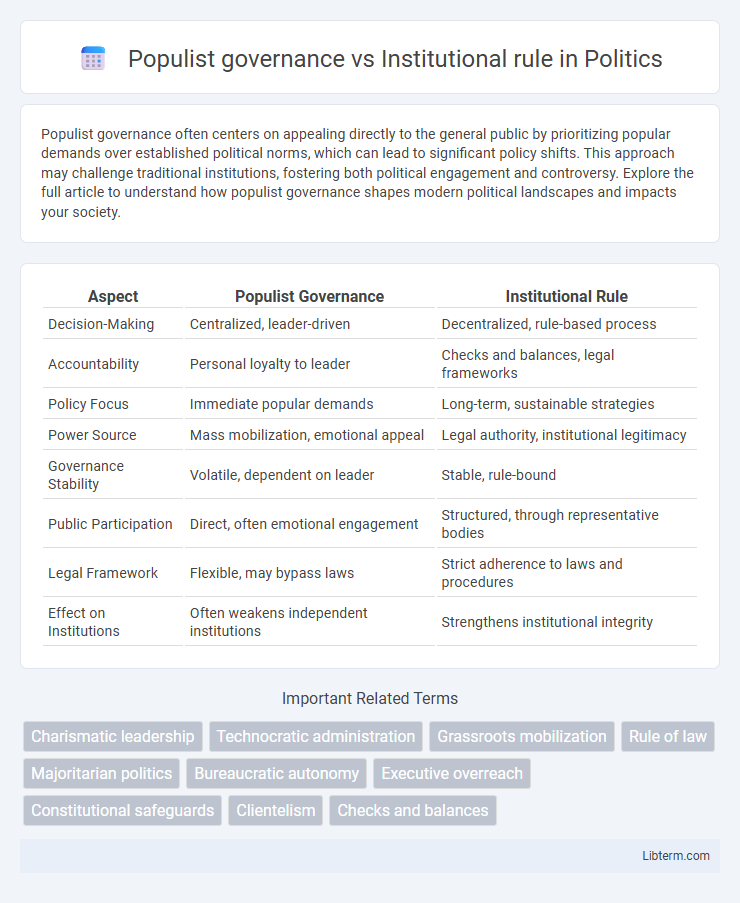Populist governance often centers on appealing directly to the general public by prioritizing popular demands over established political norms, which can lead to significant policy shifts. This approach may challenge traditional institutions, fostering both political engagement and controversy. Explore the full article to understand how populist governance shapes modern political landscapes and impacts your society.
Table of Comparison
| Aspect | Populist Governance | Institutional Rule |
|---|---|---|
| Decision-Making | Centralized, leader-driven | Decentralized, rule-based process |
| Accountability | Personal loyalty to leader | Checks and balances, legal frameworks |
| Policy Focus | Immediate popular demands | Long-term, sustainable strategies |
| Power Source | Mass mobilization, emotional appeal | Legal authority, institutional legitimacy |
| Governance Stability | Volatile, dependent on leader | Stable, rule-bound |
| Public Participation | Direct, often emotional engagement | Structured, through representative bodies |
| Legal Framework | Flexible, may bypass laws | Strict adherence to laws and procedures |
| Effect on Institutions | Often weakens independent institutions | Strengthens institutional integrity |
Defining Populist Governance
Populist governance centers on direct appeals to the general populace, bypassing established political institutions and often emphasizing charismatic leadership to mobilize mass support. This approach contrasts with institutional rule, which relies on structured, rule-based authority and normative checks and balances to ensure governance stability and predictability. Populist governance can challenge institutional frameworks by prioritizing popular will over legal-rational procedures, reshaping political dynamics in various democracies.
Understanding Institutional Rule
Institutional rule emphasizes the authority of established laws, procedures, and organizations to maintain political stability and ensure accountability. It relies on constitutional frameworks, legal processes, and separation of powers to prevent arbitrary decision-making. Strong institutions protect democratic governance by upholding transparency, checks and balances, and the rule of law.
Historical Context of Both Approaches
Populist governance often arises during periods of social unrest and economic inequality, exemplified by figures like Juan Peron in Argentina and Andrew Jackson in the United States, who mobilized mass support against perceived elite interests. Institutional rule, rooted in established legal frameworks and bureaucratic procedures, traces its development to Enlightenment principles and the establishment of modern democracies, emphasizing stability and predictable governance. Historical context shows populism challenges institutional rule by prioritizing direct popular will, while institutions seek to balance power through checks and procedural norms.
Key Characteristics of Populist Leaders
Populist leaders often emphasize direct connection with the masses, bypassing established institutions and portraying themselves as the true voice of the people against perceived elites. They employ charismatic rhetoric, simplistic solutions to complex problems, and appeal to popular grievances, which can weaken institutional checks and balances. This style contrasts with institutional rule, where governance relies on established legal frameworks, bureaucratic processes, and the separation of powers to ensure accountability and stability.
Institutional Safeguards and Stability
Institutional safeguards such as constitutional checks, independent judiciary, and regulatory frameworks ensure stability by limiting executive overreach and preserving the rule of law. Populist governance often undermines these mechanisms by concentrating power and bypassing established protocols, increasing political volatility. Strong institutional rule fosters long-term economic growth and social cohesion by maintaining predictable and transparent governance processes.
Impact on Democracy and Civil Liberties
Populist governance often centralizes power by appealing directly to the masses, which can undermine institutional checks and balances essential for protecting democracy and civil liberties. Institutional rule relies on established legal frameworks and independent bodies that enforce the rule of law, ensuring accountability and safeguarding individual rights. The tension between these approaches affects political stability, with populism risking democratic erosion and institutionalism promoting resilience and fair governance.
Economic Policies under Populist vs Institutional Rule
Populist governance frequently prioritizes short-term economic gains through direct cash transfers, subsidies, and protectionist trade measures to appeal to mass constituencies, often resulting in fiscal deficits and inflationary pressures. Institutional rule emphasizes sustainable economic policies, including transparent fiscal management, rule-based monetary policy, and regulatory frameworks that foster long-term investment and market stability. Empirical studies show countries with strong institutional rule experience higher GDP growth and lower volatility compared to those dominated by populist economic interventions.
Public Perception and Social Polarization
Populist governance often amplifies social polarization by framing political discourse as a battle between "the pure people" and "the corrupt elite," which intensifies public perception of division and distrust in established institutions. Institutional rule tends to promote stability and procedural fairness, fostering greater public confidence through adherence to established norms and transparent decision-making processes. Studies show that societies governed by institutional frameworks experience lower levels of social fragmentation and more cohesive public trust compared to those influenced by populist rhetoric.
Case Studies: Global Examples and Lessons
Populist governance often emphasizes direct popular appeals and charismatic leadership, contrasting with institutional rule that relies on established legal frameworks and bureaucratic processes, as seen in Venezuela under Hugo Chavez versus Germany's stable parliamentary system. In countries like Turkey, populist tactics have reshaped institutions, weakening judiciary independence and media freedom, whereas Canada exemplifies resilience through strong institutional checks despite political shifts. Global case studies highlight that sustainable governance depends on reinforcing institutions to balance populist impulses and protect democratic norms.
Navigating the Balance: Future Governance Challenges
Populist governance often challenges institutional rule by prioritizing direct public appeal over established legal frameworks, creating tensions in democratic stability. Navigating the balance requires strengthening institutional resilience while addressing citizens' demands for transparency and accountability. Future governance challenges will center on maintaining rule of law and preventing erosion of democratic norms amid rising populist movements globally.
Populist governance Infographic

 libterm.com
libterm.com